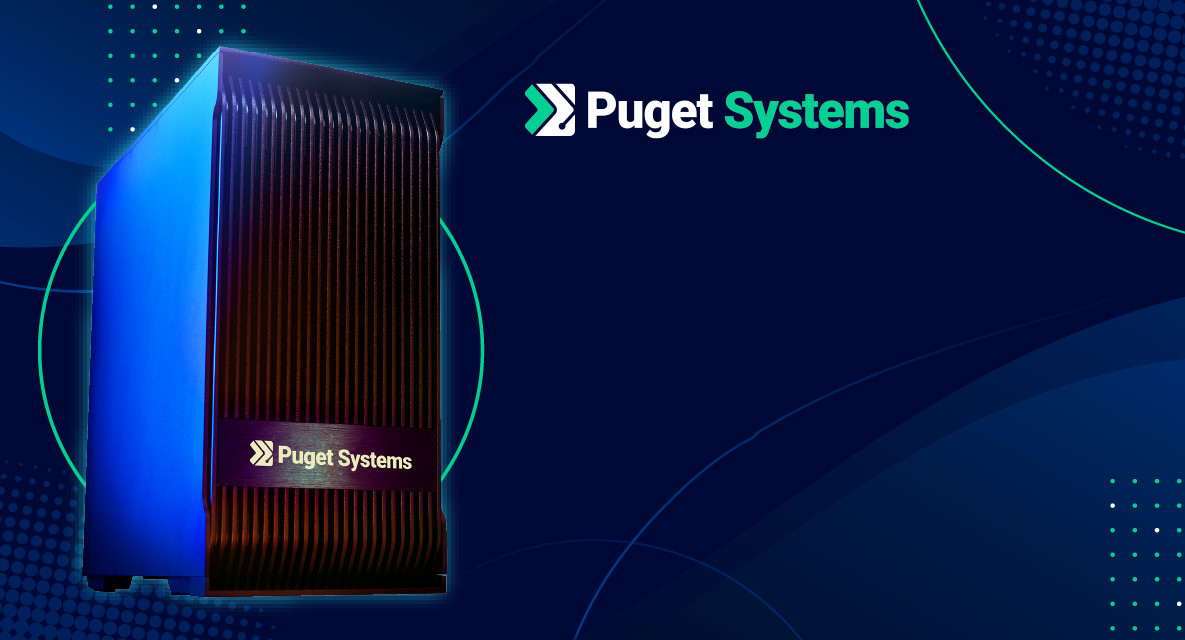Table of Contents
Introduction
The NVIDIA RTX 40 Series continues its staggered launch approach with the latest addition to the lineup, the GeForce RTX 4070 Ti 12GB. After the debut of the GeForce RTX 4080 16GB in November and the GeForce RTX 4090 24GB in October, the top three GPUs of this series are now readily available. At Puget Systems, we believe it’s an opportune moment to examine the performance of these 40 series cards in various content creation applications, including 3D rendering and video editing. In particular, we’ll be delving into GPU rendering performance in Bender, utilizing the RTX 40 Series.
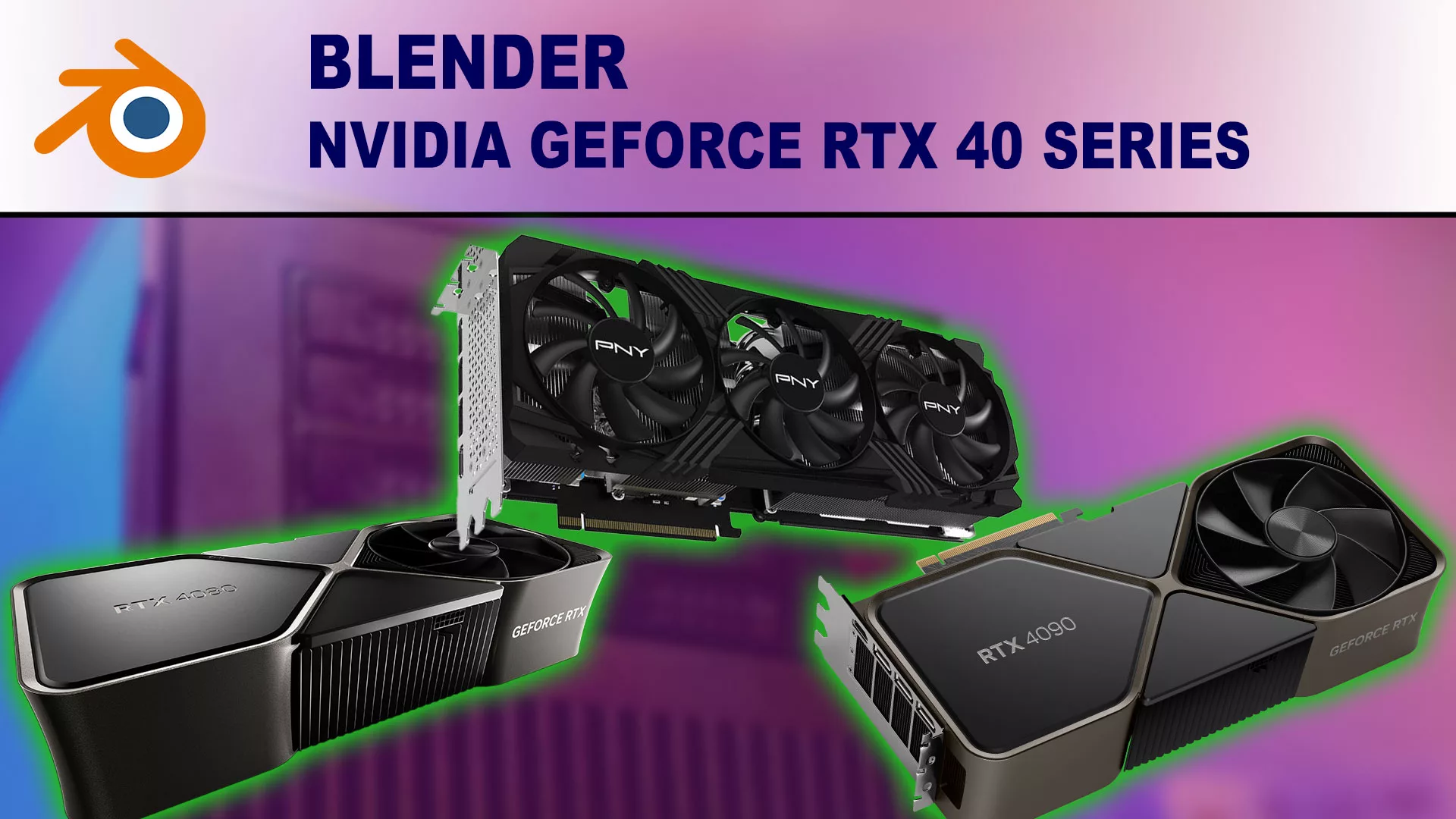
For this article, we will use Blender 3.4.0 to examine the GeForce RTX 40 Series performance for GPU rendering. As a comparison, we will include the full lineup from the previous generation GeForce RTX 30 Series, as well as the GeForce RTX 2080 Ti for additional context. We’ve also included the AMD Radeon RX 7900 XTX and RX 6900 XT. GPU rendering is dominated by NVIDIA thanks to their mature CUDA and RTX libraries, but Blender is one of the few rendering engines that fully supports AMD. It’s worth noting that when using an NVIDIA GPU, Blender defaults to Optix, while an AMD GPU defaults to HIP. Though they are different APIs, Blender compares their scores directly in their own database.
If you want to read more about the new GeForce RTX 40 Series cards (including the 4070 Ti, 4080, and 4090) and what sets them apart from the previous generation, we recommend checking out our main NVIDIA GeForce 40 Series vs AMD Radeon 7000 for Content Creation article. That post includes more detailed information on the GPU specifications, testing results for various other applications, and the complete test setup details for the hardware and software used in our testing.
Overall Blender Performance Analysis
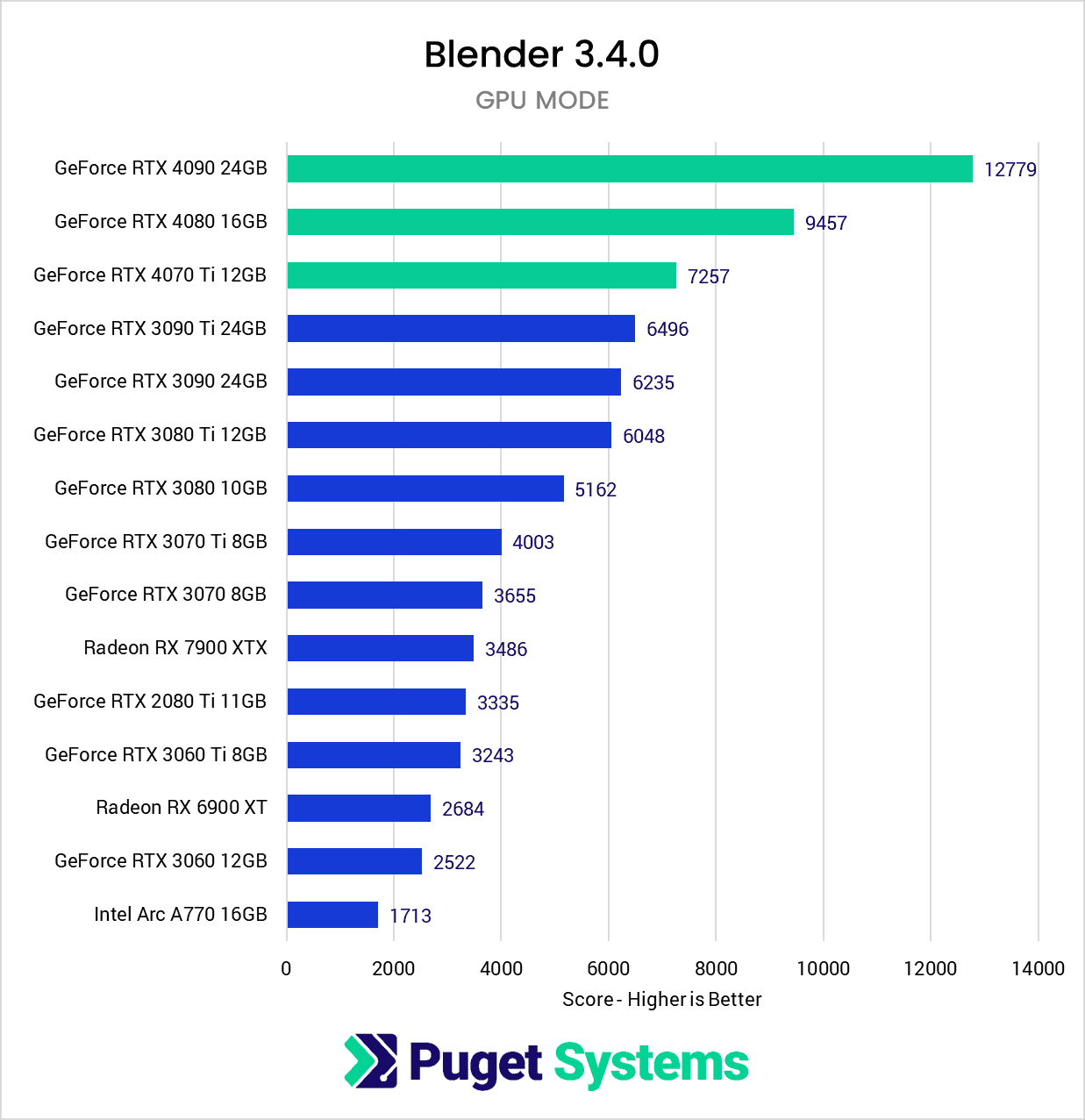
As we can see, the NVIDIA GeForce RTX 40 Series GPUs are the fastest available for rendering in Blender, taking the top three spots in our performance charts. The newest release, the RTX 4070 Ti 12GB, is faster than even the fastest previous-generation RTX 30 Series GPU. At a quick glance, all three of these video cards will be great options for GPU rendering. Next, we’ll dig into these results to get a more detailed look at how these stack up.
NVIDIA GeForce RTX 40 Series vs RTX 30 Series
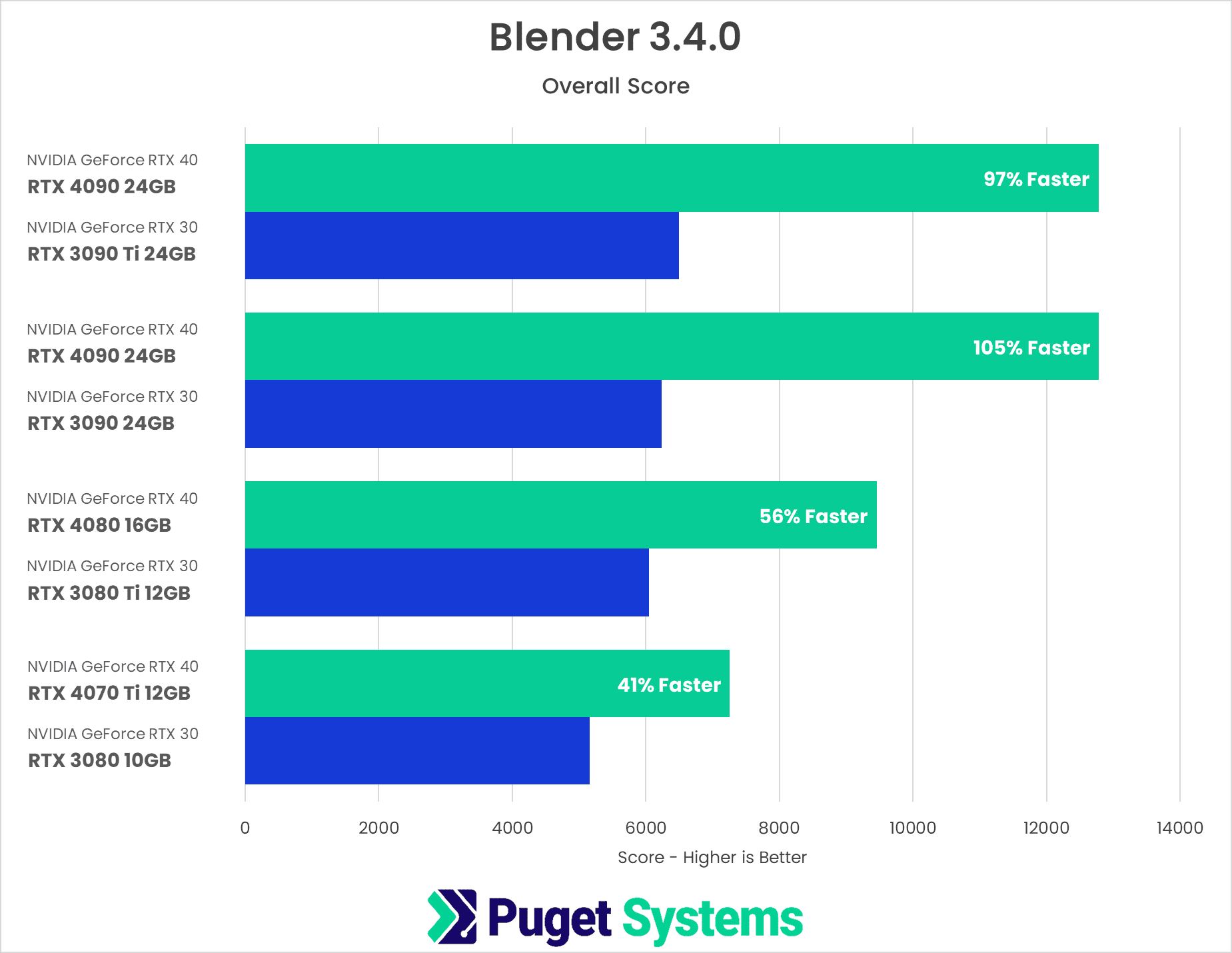
In the above chart, we compare the new generating of cards versus their closest price equivalent in the previous generation. Due to changes in architecture, supply chain, and the like, NVIDIA is not always consistent with its naming scheme, so this gives a better comparison of what performance to expect at a given price point. We added the top-of-the-line RTX 3090 Ti as well, even though it doesn’t have a price equivalent at this point.
Starting with the RTX 4090 24GB, it doubles the score of the RTX 3090 for only a modest 7% price increase. It even outpaces the much more expensive RTX 3090 Ti by 97%, a GPU less than a year old. For those looking for the best-performing GPU for rendering, the RTX 4090 24GB is hands down the best option.
Moving on to the RTX 4080 16GB. This GPU costs the same as the RTX 3080 Ti yet delivers 56% faster renders. It also increases the available VRAM from 12GB to 16GB, allowing for larger and more complex renders. Again, this is an excellent gen-over-gen improvement.
Lastly, we look at the latest release, the RTX 4070 Ti 12GB. This GPU is $100 more than the RTX 3080 10GB (roughly 14% more expensive). It returns 40% faster rendering performance for that extra cost and brings an additional 2GB of VRAM. While this is still a welcome upgrade over the RTX 3080, it’s not quite as impressive as the RTX 4090 and 4080. If we compare by product name, the new RTX 4070 Ti is 81% faster than the RTX 3070 Ti but also 33% more expensive. However we compare it, the RTX 4070 Ti provides more performance than the cost increase but is overshadowed by the gains seen by it’s more powerful siblings.
NVIDIA GeForce RTX 40 Series vs GeForce RTX 20 Series
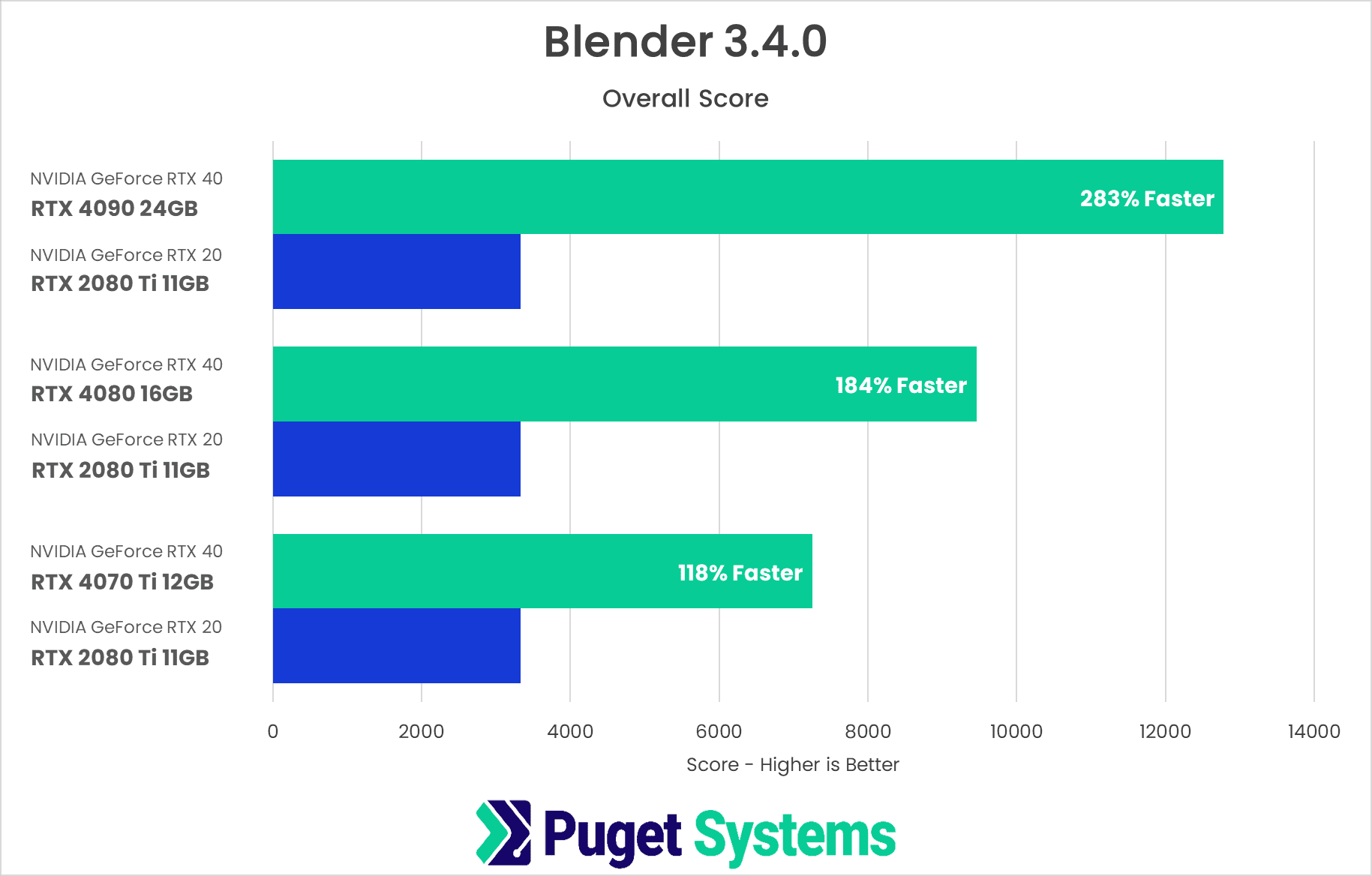
Most users don’t upgrade every generation, so we thought we’d take a moment to compare the new GPUs to the rendering king from only a few years ago. This is less of a price comparison and more just to show how much improvement a user could expect if they think it is time to upgrade. As the chart shows, if someone were to upgrade from a 2080 Ti, they would see improvements from 118% (more than 2x) on the low end to just shy of 4x faster renders on the top end, depending on which RTX 40 Series GPU you pick.
How Well Do the NVIDIA GeForce RTX 40 Series Perform in Blender?
These results show significant enhancements in rendering performance with the NVIDIA GeForce RTX 40 Series compared to the previous 30 Series. The RTX 4090 24GB shines as the top performer, showcasing a staggering 105% (more than 2x) improvement in rendering performance compared to the last generation. The RTX 4080 16GB, on the other hand, posts a more modest 56% speed boost over the similarly priced RTX 3080 Ti. Despite being 14% more expensive, the RTX 4070 Ti 12GB also offers 41% faster performance than the RTX 3080, allowing it to outperform even the RTX 3090 Ti. Although this performance increase may not be as impressive as the RTX 4090 or 4080, the 4070 Ti offers more performance relative to its cost increase.
It is worth noting that these tests do not take into account the amount of VRAM available and only examines straight GPU rendering performance. With GPU rendering, VRAM can become constrained somewhat easily as scenes become larger and more detailed. This can lead to “out of memory” errors or defaulting back to CPU rendering and losing out on GPUs’ speed advantages. Also, note that NVLink is not offered on any of these GPUs, so pooling the VRAM of two GPUs is no longer an option.
Keep in mind that the benchmark results in this article are strictly for Blender and that performance will vary widely in different applications. If your workflow includes other software packages, we highly recommend checking out our NVIDIA GeForce 40-Series vs AMD Radeon 7000 for Content Creation article, which includes results and links to in-depth testing for a range of other applications, including Premiere Pro, After Effects, DaVinci Resolve, Unreal Engine, and Octane.

